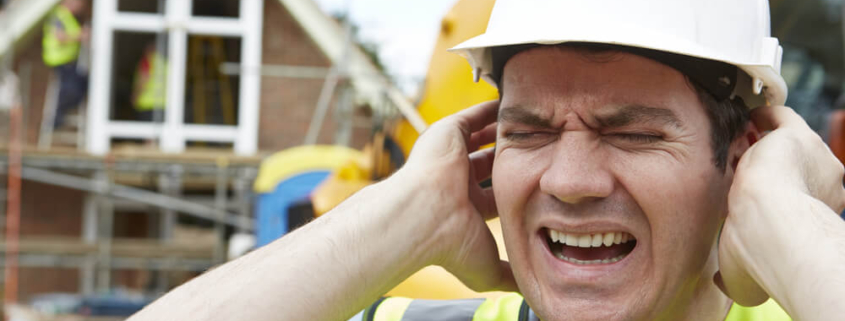Excessive Noise and Your Hearing: A Common Workplace Hazard
Hearing loss on-the-job is far more common than most people realize. According to OSHA, approximately 22 million workers in the US are exposed to potentially damaging noise in the workplace every year. In addition, the CDC reports that hearing loss is the third most common chronic physical condition among adults.
Noise pollution is prevalent in a number of different occupations and industries, and it is one of the most often overlooked workplace hazards. Overall, roughly 12% of the entire working population suffers from some type of hearing difficulty.
What Causes Occupational Hearing Loss?
Excessive noise is common in work environments in which loud equipment and machinery are used. Here are some of the most dangerous industries when it comes to the risks of noise-induced hearing loss:
- Construction
- Manufacturing
- Logging
- Mining
- Oil and Natural Gas
- Entertainment and Nightclubs
- Music Production
- Radio, Television, and Podcast Production
- Aviation
- Shooting Ranges
Common sounds that can cause hearing difficulty at work include:
- Loud music – particularly music that comes through headphones.
- Airplane takeoffs and landings.
- Chainsaws.
- Power tools.
- Manufacturing equipment.
- Gunshots.
- Various types of construction, mining, and oil drilling tools and machinery.
Work-related hearing loss happens mainly because of sustained exposure to excessively loud/hazardous noise. Loss of hearing typically occurs slowly over time, and it is not usually a painful process. In many cases, hearing gradually gets worse due to continuous noise exposure, and workers often do not realize what is happening until after the damage has become permanent.
Certain factors can accelerate the process of occupational hearing loss. For example, exposure to higher noise levels can cause a loss of hearing to develop sooner. In addition, excessive noise combined with other workplace hazards, such as exposure to toxic chemicals, sustained vibrations, and extreme heat can contribute to a more rapid decline in someone’s hearing ability.
Health Effects of Excessive Noise in the Workplace
Hearing difficulty that deteriorates into noise-induced hearing loss over time is just one of the potential hazards that workers can encounter because of excessive workplace noise. There are several other ways that hazardous noise can impact a worker’s health, including:
- Tinnitus: One common effect of hazardous workplace noise which can also serve as a warning sign of worse things to come is a condition known as tinnitus. Tinnitus is characterized by ringing or other noises in one or both ears. But the noise that you hear is not from an external sound, and others around you are usually not able to hear it. Tinnitus may come and go at first, but it can increase in frequency and intensity with continued exposure to hazardous noise.
- Psychological Effects: In addition to the auditory effects of excessive noise in the workplace, this hazard can adversely affect workers psychologically as well. Hazardous workplace noise can result in stress, trouble sleeping at night, irritation, depression, and various types of cognitive impairment.
- Cardiovascular Effects: As we mentioned in the previous point, ongoing exposure to excessive workplace noise can elevate stress levels. This can also cause high blood pressure, which can trigger more serious conditions such as strokes and heart failure.
Legal Options for those Who Suffer Occupational Hearing Loss
Noise-induced occupational hearing loss is a permanent condition, and the only remedy for those who suffer from it is some type of hearing aid or medical device such as a cochlear implant. For this reason, many employees wonder if they can sue their employer because of their hearing loss.
With most workplace injury cases, an employee is not able to bring a lawsuit against an employer who has workers’ compensation coverage. However, it may be possible to sue a West Virginia employer if it can be shown that employee’s injury resulted from the employer’s deliberate actions.
For example, an employer may be liable for employee’s noise-induced occupational hearing loss if they knowingly and intentionally disregarded OSHA safety regulations. Deliberate intent claims are very difficult to win, however, so if you are considering going this route, be sure to work with attorneys who have the proven ability to recover damages from negligent West Virginia employers.
Another possibility for workers who have lost their hearing on the job is that an outside party may be responsible. For example, a worker may have a valid product liability claim if a machinery manufacturer failed to properly warn consumers that their product could produce excessive noise, or if the excessive noise happens because of a product defect and subsequent malfunction. Personal protective equipment (PPE) manufacturers and distributors whose products fail to adequately protect workers from the effects of hazardous noise might also be at fault if a worker loses their hearing.
Defective cochlear implants and other faulty or dangerous medical devices could play a role in worsening someone’s hearing difficulty that eventually results in hearing loss. When this is the case, these manufacturers might also be liable for damages.
Contact a Reputable West Virginia Workplace Injury Law Firm
Excessive noise in the workplace can result in hearing loss and other health problems. If this has happened to you or a loved one, Bailey, Javins, and Carter L.C. is here to help. For a free consultation and case assessment with one of our experienced attorneys, message us online or call our office today at (800) 497-0234 or (800) 296-6979.



